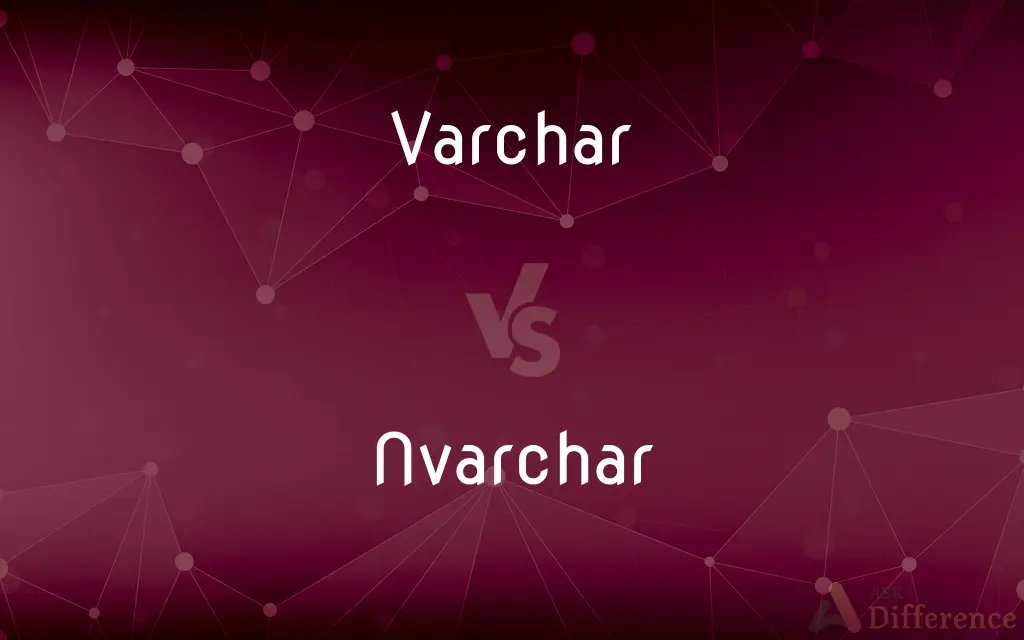Varchar vs. Nvarchar — What's the Difference?
By Tayyaba Rehman — Published on December 4, 2023
Varchar is a variable-length character data type that stores non-Unicode data, while Nvarchar stores Unicode data, accommodating a broader range of characters.

Difference Between Varchar and Nvarchar
Table of Contents
ADVERTISEMENT
Key Differences
Varchar and Nvarchar are both used in SQL databases to store text-based data. Varchar, however, deals with non-Unicode data, while Nvarchar handles Unicode data.
The primary distinction between Varchar and Nvarchar is in the characters they support. Varchar is suitable for English and European languages, but Nvarchar is essential when storing languages with a diverse range of characters like Chinese or Arabic.
Varchar generally consumes less storage space than Nvarchar because it uses one byte per character. In contrast, Nvarchar uses two bytes per character to accommodate the extended Unicode character set.
One of the consequences of Varchar using only one byte is its limitation in representing global characters. Nvarchar, with its two-byte allocation, doesn't have this limitation and can represent a wider array of global characters.
From a database design perspective, using Varchar might be efficient for applications limited to languages like English. However, if there's any possibility of the application scaling or expanding to other languages, Nvarchar would be a more future-proof choice.
ADVERTISEMENT
Comparison Chart
Data Type
Non-Unicode
Unicode
Storage Space
1 byte per character
2 bytes per character
Language Suitability
English and European languages
Wide range including Asian and Arabic languages
Character Limitation
Limited to non-Unicode character set
Can represent a vast array of global characters
Application Suitability
Local applications
Global or multilingual applications
Compare with Definitions
Varchar
Commonly used in SQL databases for text-based data.
We set the column type to Varchar for optimal performance.
Nvarchar
Represents a wide range of global characters.
The application's multilingual feature required extensive use of Nvarchar.
Varchar
Suitable for storing English and European languages.
For the English content, we decided to use the Varchar data type.
Nvarchar
A future-proof choice for scalable applications.
Anticipating global expansion, the team predominantly used Nvarchar.
Varchar
Consumes 1 byte per character in storage.
Considering the storage efficiency, the team chose Varchar for the data.
Nvarchar
Essential for languages with diverse character sets.
Given the need to store Chinese content, Nvarchar was the clear choice.
Varchar
A variable-length character data type for non-Unicode text.
The database column for first names was defined as Varchar.
Nvarchar
Uses 2 bytes per character for storage.
Due to its two-byte storage requirement, Nvarchar was used sparingly.
Varchar
Limited in representing diverse global characters.
Since we didn't expect non-European languages, Varchar was an appropriate choice.
Nvarchar
A variable-length character data type storing Unicode text.
To accommodate multiple languages, the column was set as Nvarchar.
Varchar
A text field of indeterminate length in a database, as opposed to the traditional fixed-length field.
Common Curiosities
How much storage does Varchar consume per character?
Varchar uses 1 byte per character.
Which data type is more common in SQL databases?
Both are common, but Varchar is often used for English-centric applications.
Are there storage cost implications between the two?
Yes, Nvarchar generally requires more storage, leading to increased costs.
How do I decide on the length to allocate for these data types?
It's based on the expected length of your data, but always account for possible future needs.
Can these data types handle numbers and special characters?
Yes, both can handle numbers and special characters as long as they fit within their respective character sets.
What is the primary difference between Varchar and Nvarchar?
Varchar stores non-Unicode data, while Nvarchar stores Unicode data.
Which data type is better for multilingual databases?
Nvarchar is preferred for multilingual databases due to its Unicode support.
Can Nvarchar store English language data efficiently?
Yes, Nvarchar can store English, but it uses more storage space compared to Varchar.
Can I convert data between Varchar and Nvarchar?
Yes, but care is needed to ensure no data loss, especially when converting from Nvarchar to Varchar.
Does every database support both data types?
Most modern relational databases support both, but it's good to check the specific database documentation.
Is there a significant performance difference between the two?
Performance varies based on database design, but Nvarchar might be slower due to larger storage requirements.
Should I always prefer Nvarchar for future-proofing my database?
If you anticipate needing to store diverse languages, then Nvarchar is more future-proof.
Is there a fixed-length version of these data types?
Yes, there's Char for Varchar and Nchar for Nvarchar that provide fixed-length storage.
Why would I choose Varchar over Nvarchar for an application?
If you're sure you'll only deal with non-Unicode data and want to save on storage, Varchar is suitable.
Why is Unicode support important in modern applications?
Unicode support ensures compatibility with a vast range of global characters, making applications internationally viable.
Share Your Discovery

Previous Comparison
Hydroscopic vs. Hygroscopic
Next Comparison
Fundamental Analysis vs. Technical AnalysisAuthor Spotlight
Written by
Tayyaba RehmanTayyaba Rehman is a distinguished writer, currently serving as a primary contributor to askdifference.com. As a researcher in semantics and etymology, Tayyaba's passion for the complexity of languages and their distinctions has found a perfect home on the platform. Tayyaba delves into the intricacies of language, distinguishing between commonly confused words and phrases, thereby providing clarity for readers worldwide.
















































